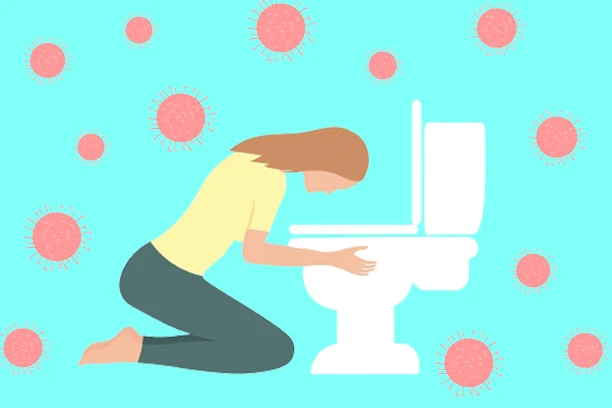Following reports from regional media outlets that the virus had been discovered in some schools in Kerala’s Ernakulam district, norovirus infection has gained attention. For all your curious minds, this article contains all you need to know about norovirus.
Norovirus infection can result in abrupt onset, severe vomiting and diarrhoea. The norovirus is quite contagious and is also known as the “winter vomiting bug.” They are frequently spread by contaminated food, water, or surfaces that were used in food preparation. Close contact with a person who is sick with norovirus can potentially transfer the sickness.
Norovirus infestations are more prevalent than usual in confined, small areas. Hospitals, elderly homes, daycare centres, schools, and cruise ships are a few examples. Here is all you need to know about norovirus.
Symptoms of Norovirus
Norovirus symptoms, which include the following, might arise suddenly:
- Nausea
- Vomiting
- Stomach pain or cramps
- Watery or loose diarrhoea
- Feeling ill
- Low-grade fever
- Muscle pain
After your first encounter with norovirus, signs and symptoms often appear 12 to 48 hours later and persist for 1 to 3 days. Even after you have recovered, you can keep shedding the virus in your stool for a few weeks. If you have a different medical condition, this shedding could last for weeks or even months.
Some people who have norovirus may not show any symptoms at all. However, they can still spread the disease and infect others.
When to see a doctor
If you experience diarrhoea that doesn’t go away after several days, see a doctor. If you develop severe vomiting, bloody stools, stomach pain, or dehydration, you should also contact your healthcare professional.
Causes of Norovirus
The norovirus is very contagious. That implies that norovirus infection is easily contagious. Both vomit and stools contain the virus. Noroviruses can persist on surfaces and objects for days or weeks.
The norovirus causes can include:
- Eating contaminated food
- Drinking contaminated water
- Putting your hand to your mouth after it has come into contact with a contaminated item or surface
- Being in close proximity to someone who is sick with the norovirus
Noroviruses are challenging to eradicate because they can survive in both high and low temperatures as well as a wide range of disinfectants.
Risk factors of Norovirus
There are several potential causes of norovirus infection.:
- Consuming food that has been in contact with contaminated water or surfaces, or that has been handled by someone who has the norovirus
- Attending a preschool or daycare facility
- Being confined to a small space, as in nursing homes
- Staying in lodgings like hotels, resorts, cruise ships, or other places where there are a lot of people around
- Being in contact with someone who has a norovirus infection
Complications
Most persons who contract norovirus recover quickly and without any negative side effects. However, for some people, including small children, elderly adults, those with weakened immune systems, those with other medical conditions, and pregnant women, norovirus infection can be quite serious. Norovirus infection can cause severe dehydration and even death.
Warning signs of dehydration include:
- Fatigue
- Dry mouth and throat
- Listlessness
- Dizziness
- Decreased urine output
Dehydrated children may cry sparingly or hardly at all. They could act unusually cranky or drowsy.
Prevention of Norovirus
The norovirus is extremely contagious. Noroviruses come in a variety of varieties. Anyone can contract the norovirus more than once.
To avoid contracting the norovirus:
- Particularly after using the restroom or changing a diaper, wash your hands thoroughly with soap and water for at least 20 seconds before preparing food, eating, or drinking. Noroviruses are more resistant to soap and water than alcohol-based hand sanitizers.
- Avoid contaminated food and water, especially food that may have been prepared by a sick person.
- Wash fruits and vegetables before consuming.
- Cook seafood thoroughly.
- Surfaces that might be contaminated should be disinfected. Put on gloves and use a disinfectant that is efficient against noroviruses or a chlorine bleach solution.
- Be cautious while travelling. Consider eating only prepared foods, consuming only hot or fizzy beverages, and staying away from food served by street sellers if you’re travelling to locations where there is a significant risk of contracting the norovirus.
As a means of reducing the transmission of the norovirus, during illness and for two to three days after symptoms have subsided:
- Try to limit your contact with other people.
- Use soap and water to thoroughly wash your hands.
- Continue working at home. Children should skip out on daycare or school.
- Don’t handle food or objects intended for other people. Use a disinfectant that is efficient against noroviruses to clean up contaminated surfaces.
- Be careful how you dispose of faeces and vomit. Put on disposable gloves, and use disposable towels to absorb the substance. To prevent the airborne transmission of noroviruses, handle contaminated materials as little as possible. Put dirty objects in plastic bags and throw them away. Remove and clean any potentially contaminated clothing and linens.
- Travel should be avoided until two to three days after your symptoms have subsided.


One Comment
Pingback: All You Need To Know About Norovirus – Sujata Birla Hospital